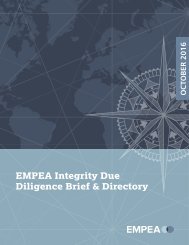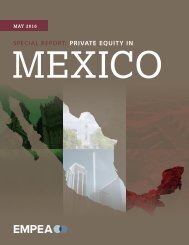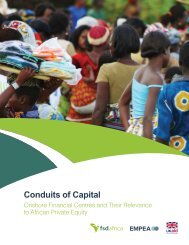MEXICO
1r3fkNK
1r3fkNK
You also want an ePaper? Increase the reach of your titles
YUMPU automatically turns print PDFs into web optimized ePapers that Google loves.
30 | SPECIAL REPORT: PRIVATE EQUITY IN <strong>MEXICO</strong><br />
Case Study: Liquid Capital<br />
The case of The Abraaj Group’s investment in Liquid Capital illustrates how a Mexican<br />
business can benefit from the value creation initiatives a private equity firm brings to<br />
the table in addition to its capital—and the knock-on effects to an economy that can<br />
result. In Liquid Capital, Abraaj saw an opportunity to invest in a high-growth company<br />
while supplying a critical part of the broader business infrastructure. Additionally, Liquid<br />
Capital’s leasing operation addressed a major bottleneck in Mexico’s business ecosystem:<br />
the scarcity of bank financing, especially for SMEs. By leasing their office equipment,<br />
Mexican entrepreneurs could preserve and extend their precious capital.<br />
Liquid Capital’s Story<br />
In 1996, Xerox decided to transfer its<br />
Mexican print equipment distribution<br />
business to independent operators. Adam<br />
Wiaktor, an executive of the company at<br />
the time, decided to step in and acquire<br />
the franchise himself, thus creating Liquid<br />
Capital (previously named Docuformas).<br />
One of the individuals involved early in<br />
the history of Liquid Capital approached<br />
members of Abraaj’s team for funding in<br />
2007. By January 2008, Abraaj had agreed<br />
to invest. The investment rationale was<br />
compelling: the Mexico City-based company<br />
was a market leader with a record of rising<br />
profits and strong cash flow. Through its<br />
strategic alliances with Hewlett-Packard<br />
and Xerox, it obtained machines at a<br />
substantial discount to their selling price.<br />
In addition, the management team was<br />
dedicated to continued growth through<br />
new product lines, such as medical and<br />
optical equipment leasing, funded by the<br />
additional capital supplied by Abraaj.<br />
The years leading to 2012, however, did<br />
not entirely conform to the script, as<br />
the global financial crisis threatened the<br />
company’s lines of credit. Although Abraaj’s<br />
investment team managed to arrange<br />
additional financing for the company,<br />
the chaos of the crisis resulted in a year<br />
of lost growth. During 2012, however,<br />
the new product lines and an emphasis<br />
on franchised leasing operations put the<br />
company on a renewed growth path.<br />
Today Liquid Capital is the second largest<br />
independent leasing company in Mexico. The<br />
company has two operating units—Liquid<br />
Capital and Liquid Capital Franchises—and<br />
a subsidiary named ARG, a leasing company<br />
acquired in December 2014:<br />
• Liquid Capital: engages in sales of office<br />
equipment and related software, supplies,<br />
parts, service and technical support.<br />
• Liquid Capital Franchises: offers factoring<br />
and leasing facilities for various clients.<br />
The Company<br />
Essentials<br />
Company: Liquid Capital<br />
(Docuformas S.A.P.I. de C.V.)<br />
(www.liquidcapital.mx)<br />
Sector: Diversified financial services<br />
Business focus: Providers of lease<br />
financing<br />
GP: The Abraaj Group, a private<br />
equity investor in growth markets<br />
with approximately US$9.5 billion<br />
in assets under management<br />
(www.abraaj.com)<br />
Date of Investment: January 2008<br />
• ARG: provides fleet management services<br />
to medium sized companies.<br />
Since the acquisition of ARG, Liquid Capital<br />
has focused on capturing commercial and<br />
operational synergies, and increasing top line<br />
revenue through organic growth by opening<br />
new franchises, increasing contract values<br />
and exploring new sectors.<br />
The Role Played by Private Equity<br />
Concentrating on governance and risk,<br />
Abraaj worked closely with the management<br />
team to develop a viable business plan<br />
that included a diversification strategy to<br />
focus on new business lines. Abraaj helped<br />
strengthen the company’s governance<br />
processes, including the establishment of a<br />
well-functioning Board, and a risk framework<br />
that enhanced accounting and reporting<br />
standards; for instance, by adopting IFRS in<br />
place of Mexican GAAP. Furthermore, risk<br />
analytics and the credit approval processes<br />
were strengthened using stronger customer<br />
data analytics. Abraaj also introduced the<br />
company to the Balanced Scorecard and<br />
Strategy Map to identify the company’s<br />
strengths, weaknesses, opportunities and<br />
threats, while improving communication<br />
amongst co-workers and departments.<br />
Moreover, Abraaj provided crucial support<br />
for the company during the global financial<br />
crisis. Lending to financial companies in<br />
Mexico was severely restricted, and when<br />
available, it was at uneconomic interest rates.<br />
The Abraaj team accepted the challenge of<br />
helping Liquid Capital maintain old credit<br />
lines and opening new ones. In January<br />
2009, Abraaj convinced Mexico’s National<br />
Development Bank (Nacional Financiera) to<br />
guarantee 30% of the company’s debt.<br />
By 2012, Abraaj and management were<br />
successful in shifting from leasing office<br />
equipment, a market that was shrinking, to<br />
providing other types of financial services<br />
for SMEs. Most significantly, the company<br />
purchased a master franchise for Mexico<br />
from Canada’s Liquid Capital, resulting in the<br />
firm’s name change and through which the<br />
company can sell franchises to entrepreneurs<br />
interested in establishing receivables for<br />
factoring and leasing services.<br />
Among other achievements, during Abraaj’s<br />
investment period, the company has<br />
revitalized its employee training through<br />
an association with a local university,<br />
totaling 8,874 man-hours with<br />
approximately US$183,000 invested<br />
in training in 2015 alone.





